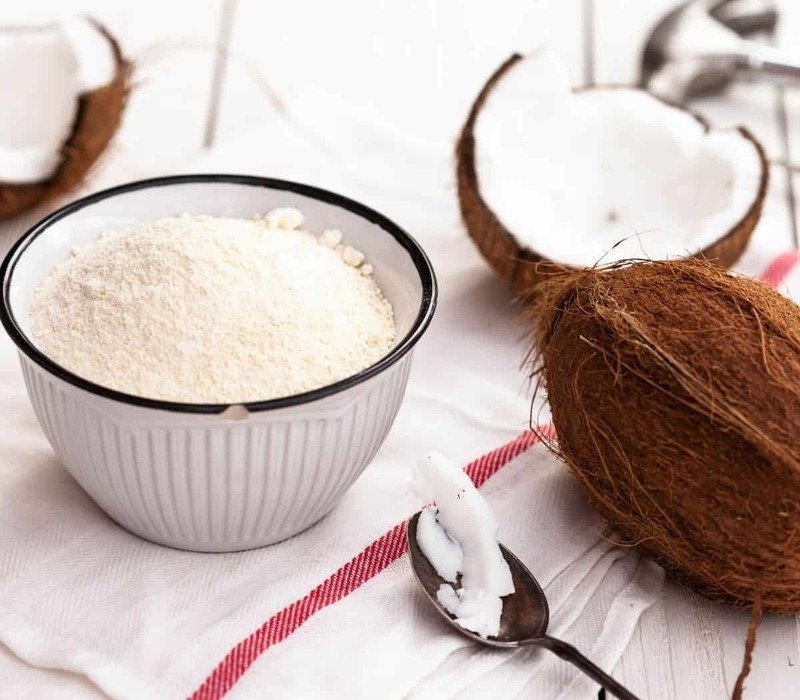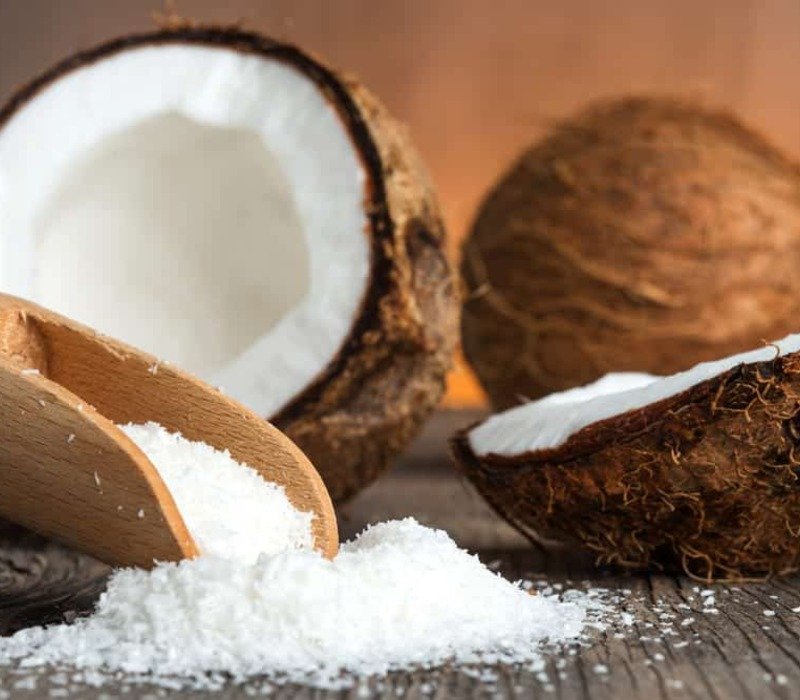Carbs in coconut flour are a special option in contrast to wheat flour. It’s well known among low-carb fans and individuals who have gluten-related messes.
Notwithstanding its great nourishment profile, coconut flour might offer a few advantages when delighted as a feature of a sound eating routine. These remember upgrades for glucose strength, assimilation, and heart well-being.
Coconut flour is one of the numerous food items produced using the product of the palm tree Cocos nucifera. Produced using dried, ground coconut meat, coconut flour is a characteristic result of coconut milk creation.
Like wheat flour, coconut flour is a white or grayish flour generally utilized in baking. Since it doesn’t contain gluten, individuals on without gluten diets can substitute coconut flour in their recipe for heated merchandise.
In spite of the fact that coconut flour can be utilized as a substitute for wheat flour, numerous recipes should be acclimated to represent its different creations. Coconut flour is thicker than wheat flour and holds more fluid. Since it is sans gluten, batters made with coconut flour should be blended longer.
Page Contents
What Are Carbs in Coconut Flour?

Carbs in Coconut flour are produced using coconut tissue that has been dried and ground.
It’s a side-effect of coconut milk and oil creation.
During assembling, coconuts are first aired out and depleted of fluid. The coconut meat is then scratched out, washed, ground, and stressed to isolate the solids from the milk. The solids are then prepared at a low temperature until dry prior to being ground into flour.
The subsequent white powder looks and feels like flour produced using grains like wheat. Its flavor is gentle.
Carbs in Coconut flour are normally utilized in sans-gluten and without-grain food sources like cupcakes, bread, and treats. I have also written an article on Carbs in Saltine Crackers Are Good to Eat.
Carbs in Coconut Flour Sustenance
Coconut flour have a great supplement profile, being especially high in fiber, potassium, iron, and plant-based protein.
A 1/4-cup (28-gram) serving of coconut flour contains:
| Calories | 120 |
| Carbs | 18 grams |
| Sugar | 6 grams |
| Fiber | 10 grams |
| Protein | 6 grams |
| Fat | 3 grams |
| Iron | 11% of the Day to day Worth (DV) |
| Potassium | 13% of the DV |
Contrasted and wheat flour, coconut flour is higher in fiber, protein, and certain nutrients and minerals, like potassium and iron.
Potassium and fiber are supplements that are regularly under-consumed in advance and eat fewer carbs, which can prompt medical problems, for example, raised coronary illness chance and stomach-related issues.
Adding coconut flour to your eating routine can assist you with meeting the suggested day-to-day admission for these significant supplements.
Moreover, on the grounds that coconut flour is lower in starches and higher in protein than customary wheat flour, it’s a well-known decision for those following low-carb dietary examples.
Carbs in Coconut Flour Benefits
Carbs in Coconut flour have a different supplement profile and may offer a scope of medical advantages. All things considered, scarcely any investigations have straightforwardly inspected it.
Carbs in Coconut Flour May Assist With Keeping Glucose Stable
Coconut flour is loaded with fiber, which might advance solid glucose levels.
A 1/4 cup (28-gram) serving gives an incredible 36% of the DV for fiber. That is multiple times as much as regular baking flour.
Food sources wealthy in fiber assist with managing glucose levels by dialing back the speed at which sugar enters your circulation system.
Concentrates on showing that higher fiber eats fewer advantages to those with diabetes by diminishing glucose and insulin levels while advancing a solid body weight.
Since coconut flour is additionally lower in starches and higher in protein than regular flour, it’s better at advancing sound glucose guidelines.
Likewise, more seasoned research shows that adding coconut flour to heated merchandise brings down their glycemic file (GI). The GI is a proportion of a food’s effect on glucose levels.
Advances Stomach-Related Wellbeing
Carbs in Coconut flour’s high fiber content pursues it a decent decision for keeping your stomach-related framework solid.
The vast majority of its fiber is insoluble, which adds mass to stools and helps move food easily through your stomach, subsequently lessening the gamble of stoppage.
Concentrates on showing that eating less high in fiber might diminish the gamble of various ailments that influence the gastrointestinal system, including colon malignant growth.
Also, more seasoned research proposes that coconut flour contains modest quantities of solvent fiber and other fermentable strands that feed the advantageous microbes in your stomach.
Thus, these microbes produce short-chain unsaturated fats like acetic acid derivation, propionate, and butyrate, all of which feed your stomach cells. Read more about Reasons to Drink Carbs in Tomato Juice.
Carbs in Coconut Flour May Lessen Coronary Illness Risk Factors

In view of its high fiber and potassium content, consuming carbs in coconut flour might uphold heart well-being by decreasing coronary illness risk factors.
In particular, research proposes that eating coconut flour might assist with decreasing cholesterol and fatty substance levels.
A concentration of 42 ladies who were viewed as overweight found that consuming a low-calorie diet that included 26 grams of coconut flour each day for quite some time diminished all-out cholesterol and glucose levels. Thusly, this might lessen coronary illness risk.
Likewise, coconut flour is a decent wellspring of potassium, which is fundamental for advancing and keeping up with sound circulatory strain levels. Having raised glucose levels expands the gamble of creating coronary illness.
In any case, more examination is expected to find out about this conceivable advantage.
Carbs in Coconut Flour May Assist With Supporting a Solid Body Weight
Coconut flour might assist you with keeping a solid body weight.
It offers both fiber and protein. These supplements are significant for craving guidelines and can assist with keeping you feeling full between feasts. This could lead you to diminish your general calorie consumption.
The research proposes that consuming fewer calories high in protein and fiber might try and advance weight reduction.
For instance, a concentration of 345 individuals observed that the most compelling indicator of weight reduction was dietary fiber, free of calorie and macronutrient consumption.
In any case, despite the fact that dietary examples high in fiber and protein probably upgrade weight reduction and back solid body weight, there’s right now no proof that straightforwardly connects coconut flour to weight reduction.
Liberated From Gluten and Grains
Carbs in Coconut flour are liberated from gluten, so it’s a reasonable choice for individuals with celiac infection, wheat sensitivity, or non-celiac gluten responsiveness.
Gluten is a gathering of proteins tracked down in specific grains, including wheat, grain, and rye. Individuals who can’t endure gluten might encounter side effects going from gas, issues, or looseness of the bowels to destroy harm and supplement malabsorption subsequent to ingesting it.
Individuals with celiac sickness or wheat sensitivity ought to stay away from all gluten-containing grains, while those with non-celiac gluten responsiveness can decide to either diminish their utilization or kill the protein from their eating regimen.
If you want to see more then watch this video. Coconut flour offers an option in contrast to wheat and other gluten-containing flour. It’s likewise normally without grain, so it’s a well-known decision for those following without-grain diets, for example, the paleo diet.
Carbs in Coconut Flour Utilizes
You can utilize carbs in coconut flour in various recipes, both sweet and exquisite. It’s a famous element for those following without gluten and sans grain eats fewer carbs.
You can substitute it for different sorts of flour while making bread, hotcakes, treats, biscuits, or other heated merchandise. Notwithstanding, be careful that coconut flour will in general retain more fluid than different kinds of flour, so you can’t involve it as a balanced substitution.
For the best outcomes, begin by subbing 1/4 cup (28 grams) of coconut flour for each 1 cup (120 grams) of regular flour.
You may likewise need to build the fluids by how much coconut flour you add. For instance, assuming that you utilize 1/4 cup (28 grams) of coconut flour, pour in 1/4 cup (60 mL) of extra fluids.
Further, recollect that coconut flour will in general be denser than different kinds of flour and doesn’t tie as without any problem.
Pastry specialists frequently suggest that you blend it in with different kinds of flour or add 1 egg for every 1/4 cup (28 grams) of coconut flour to give your final result a fluffier, gentler surface.
This special flour can likewise be utilized as breading or to thicken soups and stews. Furthermore, you can involve it as a limiting specialist in a burger or veggie portion recipes, as well as to make sans grain pizza covering or wraps. Another on How to Make Carbs in Lime Juice?
How can it Contrast With Different Sorts of Sans Gluten Flour?

Coconut flour is frequently contrasted and different sorts of without-gluten flour, for example, almond and earthy-colored rice flour.
Here is an outline looking at the nourishment content of these:
| 1/4 cup (28 grams) Coconut Flour | 1/4 cup (30 grams) Almond Flour | 1/4 cup (39.5 grams) Brown Rice Flour | |
|---|---|---|---|
| Calories | 120 | 200 | 143.5 |
| Fat | 3 grams | 16 grams | 1 gram |
| Protein | 6 grams | 6 grams | 3 grams |
| Carbs | 18 grams | 6 grams | 30 grams |
| Fiber | 10 grams | 2 grams | 2 grams |
Coconut flour is lower in calories than earthy-colored rice and almond flour. It’s additionally a lot higher in fiber. It contains a similar measure of protein as almond flour yet is higher in protein than earthy-colored rice flour.
Those on low-carb slims down like the keto diet might need to decide on almond flour since it contains just 33% of the carbs found in coconut flour.
The main advantage of picking coconut flour over others without gluten choices is its astoundingly high fiber content.
Albeit this large number of flours are great choices for without-gluten baking, a recent report found that utilizing a mix of coconut and almond flour in without-gluten keto-accommodating cupcakes brought about more delicate, delicious, and damp cupcakes than utilizing just coconut flour.
Carbs in Coconut Flour Fixings
| 1 huge coconut | |
| 4 cups bubbling water |
Directions
Cut an opening in the coconut and empty out the coconut juice.
Eliminate the skin from the coconut and cleave up the coconut tissue.
Move the coconut meat into a blender. Add the bubbling water and mix together for 1-2 minutes, until no huge pieces remain and the mash is for the most part smooth. Allow the combination to sit in the blender for 5 minutes to chill off.
Preheat the broiler to 80C/170F and line an enormous baking sheet with material paper. Put it away.
Strain the blend through a cheesecloth and press out the overabundance of fluid.
Place the dry coconut mash onto the lined baking sheet. Prepare for 40-45 minutes, until the mash is totally dry.
Eliminate the dry coconut from the stove and spot it back in the blender. Mix for 1-2 minutes, until a flour-like consistency remains. Move into an impermeable compartment until prepared to utilize.
Conclusion
Coconut flour is a sans-gluten flour made exclusively from coconuts. It’s high in fiber and is a decent wellspring of protein. Adding it to your eating routine might advance stable glucose, great absorption, and heart well-being.
It might likewise uphold a solid body weight when consumed as a feature of a nutritious, adjusted diet. Furthermore, it’s tasty and flexible, so it’s a savvy decision when picking a flour elective.
Coconut flour is a sans-gluten flour made exclusively from coconuts. It’s high in fiber and is a decent wellspring of protein. Adding it to your eating regimen might advance stable glucose, great processing, and heart well-being. It might likewise uphold a sound body weight when consumed as a feature of a nutritious, adjusted diet.
Almond flour is a lot higher in calories and fat than coconut flour, and furthermore is more supplement thick with higher measures of minerals and nutrients.
Coconut flour is by and large a protected option in contrast to wheat flour for the vast majority. It has somewhat not have many well-being dangers or secondary effects. In any case, the high measure of fiber in coconut flour might cause bulging in certain individuals.
Coconut flour is wealthy in dietary fiber, which can assist with diminishing the gamble of creating coronary illness and lowering cholesterol levels. As it is low in starch contrasted with flour, for example, wheat and corn, it is valuable for individuals with diabetes since it gently affects blood glucose levels.


